SUMMARY
This is AI generated summarization, which may have errors. For context, always refer to the full article.
![[OPINION] The Philippines must pass bill against climate-related loss and damage](https://www.rappler.com/tachyon/2023/11/imho-KLIMA.jpg)
Today marks the 10th anniversary of the landfall of super-typhoon Yolanda (Haiyan) in the Philippines. It not only changed climate change in the eyes of the Filipino nation into a crisis and an emergency; it also turned the issue of loss and damage (L&D) into a matter of global significance.
L&D refers to climate change impacts that cannot be sufficiently addressed by mitigation and adaptation strategies. It is a principle born out of the reality that nations and communities who contributed the least to the climate crisis are the ones that are experiencing the worst of its impacts.
This injustice is well-documented in the Philippines, especially in the case of Yolanda. This super-typhoon caused the highest economic L&D dealt by a storm in our history at P89.6 billion. Six of the next nine most destructive storms have occurred after Yolanda.
Even though the country should already be well-prepared as it is hit by an average of 20 storms a year, the fact that recent typhoons have brought among the highest L&D indicates that some climate change impacts may already be too much for the Philippines to properly handle.
The push for a global L&D funding facility, with the funding sourced from the rich countries that caused the most pollution triggering the climate crisis, remains a divisive topic at the global negotiations. While this facility is being set up, it is necessary for the Philippines to also show initiative and exercise available options to respond to the needs of those hit by L&D.
The Philippines must actively fight for L&D funding and climate justice, but it also cannot just sit and wait for help to arrive. The State has a mandate to protect the well-being of its citizens through available means, especially in the era of the climate emergency.
As a response to the call for justice for those affected by L&D, the Climate Accountability (KLIMA) Bill must be enacted by Congress. With its content largely based on insights of grassroots movements and climate advocates, the bill features two major components: business accountability and a national fund to address L&D.
Business accountability
The KLIMA bill is built on the “polluters pay” principle, holding fossil fuel corporations accountable for harm done by their operations on communities. It is a staple principle found in Philippine environmental laws and places this bill under the social justice framework.
It would also mark the first adoption of the UN Guiding Principles on Business and Human Rights into national law. Among the businesses’ main responsibilities would include climate finance-related disclosures to the Securities and Exchange Commission, exemplifying their respect for human rights in all of their operations, and exercising due diligence in monitoring and reporting their activities in the lens of human rights.
The KLIMA bill also prohibits businesses to pass on the burden for the damage caused by their pollution. For a nation currently with a policy framework that allows coal-fired power plant operators to pass on their financial losses to electricity consumers, this would be a huge step in protecting the climate and environment-related rights of Filipinos.
It also empowers citizens to seek redress against businesses that violate or fail to comply with this bill, should it be passed. Policy reports and legal papers have recently emerged that lay the basis for corporate directors and trustees to account for climate risks and disclose them through sustainability reports, which should include tracked environmental, social, and governance (ESG) data.
Under this bill, minors, future generations, and even biodiversity would be allowed as petitioners if they are represented by a legal guardian, in compliance with the existing Rules of Procedure for Environmental Cases. Public officials may also be subjected to citizen-led lawsuits for neglect of their duties related to the proposed legislation.
Climate change victims’ fund
The KLIMA bill would also establish a national fund that will be used to respond to claims made by persons and communities after being hit by climate-related events, such as typhoons, droughts, and sea level rise.
This fund would have an initial allocation of P1 billion, which would increase as the need arises. Part of this funding would be sourced from penalties and taxes imposed on fossil fuel corporations, aligned with the “polluters pay” principle.
Said fund would be overseen by an independent board, with significant representation from the most vulnerable groups to the climate crisis, such as the youth and indigenous peoples. It would assess the claims for compensation, impose penalties on violators, and administer the funding itself, among other functions.
A national L&D fund should learn from the challenges observed with the People’s Survival Fund (PSF), a similarly-structured funding mechanism that focuses more on adaptation for the most vulnerable communities in the Philippines. Pitfalls such as little disbursement of the fund since its inception a decade ago, difficulties in accessing said funding by applicants, and bureaucratic inefficiencies need to be avoided should the CCVF be established.
It should be noted that the Philippines incurred an average of more than P50 billion of L&D every year in the past decade, which makes the P1 billion allocation for the national L&D fund pale in comparison. This highlights the need for our government to actively lobby for global climate finance that meets the needs and priorities of developing nations through justice-anchored ways of providing support. It also makes upholding business accountability, especially on imposing penalties for violations, extremely significant.
Nevertheless, it must be emphasized that our government still must implement measures to address L&D at the domestic level, in the meantime. Passing the KLIMA bill would mark a milestone in the Filipinos’ pursuit of climate justice to ensure that there is none left behind. – Rappler.com
John Leo Algo is the Deputy Executive Director for Programs and Campaigns of Living Laudato Si’ Philippines and the National Coordinator of Aksyon Klima Pilipinas. He is also a member of the Youth Advisory Group for Environmental and Climate Justice under the UNDP in Asia and the Pacific. He is a climate and environment journalist since 2016.
Add a comment
How does this make you feel?


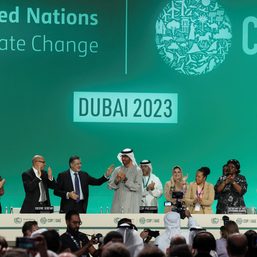
![[OPINION] Hoping amidst ‘this thing’: COP28 reflections from a 24-year-old first-timer](https://www.rappler.com/tachyon/2024/01/imho-c0-28-reflection.jpg?resize=257%2C257&crop=297px%2C0px%2C720px%2C720px)
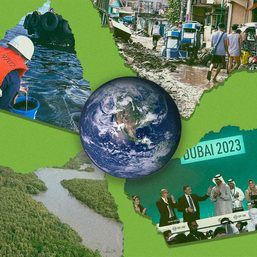
![[OPINION] Is limiting warming to 1.5°C still alive after COP28?](https://www.rappler.com/tachyon/2023/12/imho-cop28.png?resize=257%2C257&crop=285px%2C0px%2C720px%2C720px)
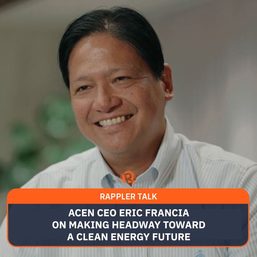

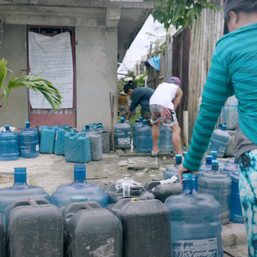
![[Under 3 Minutes] Kumusta na ang Yolanda housing projects?](https://www.rappler.com/tachyon/2023/11/title-card-ls-3.jpg?resize=257%2C257&crop_strategy=attention)
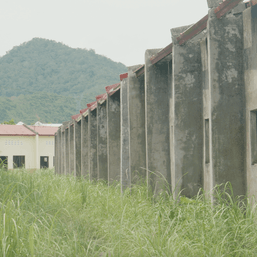
There are no comments yet. Add your comment to start the conversation.